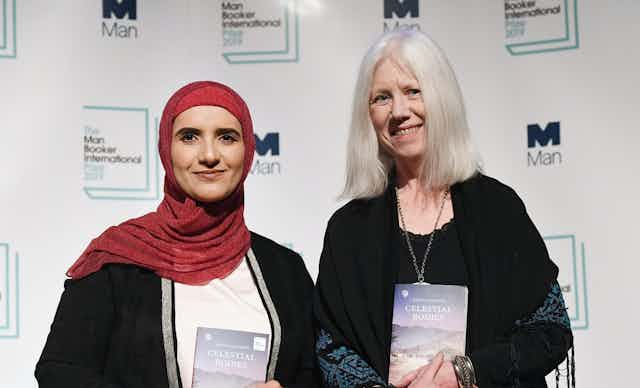It says something that the winner of the 2019 Man Booker International prize for Literature, Jokha Alharthi, is the first woman from her country to have a novel translated into English. Alharthi – from the Arabian Gulf state of Oman – who won for her novel Celestial Bodies, shares the £50,000 prize with her translator Marilyn Booth. The book has the distinction of also being the first novel translated from Arabic to win the award.
“I am thrilled that a window has been opened to the rich Arabic culture,” Alharthi told journalists after the ceremony in London in May. “Oman inspired me but I think international readers can relate to the human values in the book – freedom and love.”
Celestial Bodies revolves around three sisters from a middle-class background in the small Omani village of al-Awafi. The novel is a fragmented collection of past and present events in Oman as they pertain to particular characters in this small village. These intricate storylines come together to shape the broader narrative of the novel, of a village going through remarkable change.
Celestial Bodies gives the reader a glimpse into a society that isn’t often spoken about in terms of its literature, culture and traditions. And a woman’s perspective is particularly rare – Arab Gulf women only really began publishing their writings in the second half of the 20th century. It’s a trend that is intimately connected to the introduction of girls’ education – spanning half a century between 1928 and 1970 in different Gulf states.
But this doesn’t mean that Arab Gulf women weren’t producing literature before then – they were particularly well known for the tradition of oral storytelling and were especially esteemed for their poetry – the works of Kuwaiti poet Suad al-Sabah and Bahraini poet Hamda Khamis are particularly worth checking out.
But it was the explosion of oil wealth, which forced the Arabian Gulf out of isolation and into the international arena – leading to the establishment of schools and newspapers and media outlets that allowed for literary creativity. Since the 1970s, Arab Gulf women’s writing has evolved – now Arab Gulf women write in a whole range of genres that reflect different themes and issues through their storylines, especially those issues which pertain to the specific experience of women in Arab Gulf society. But the novel is still something of a recent genre for Gulf women.
Modernity and nostalgia
One common theme in Arab Gulf writings is nostalgia for a simpler past, which is often used in contrast to the remarkably fast growth these countries have undergone with the discovery of oil. The narrative of Celestial Bodies draws a connection between the slave trade in Oman – the backdrop of the story – with the way Omani society started to change with the introduction of oil wealth into the region.
Although Alharthi positions her story within this narrative of tradition versus social change, she does so in a way that offers an objective outlook to the practices and history portrayed in the novel. She does this by portraying neither a romanticising of the past nor an overly optimistic focus on the positive aspects of oil revenue in the present. Instead, Celestial Bodies presents an honest portrayal of change and how it has affected different members of the village she is writing about.

A defining feature of Omani literature is that Oman, in particular out of the Arab Gulf, has remained a traditional society in many aspects, which is oftentimes reflected in the writings produced in the region. The novel makes use of specific cultural and religious features of Oman and the Arab Gulf region, such as references to supernatural spirits – or jinn – as well as the all-important date harvest – as well as allusions to classical Middle Eastern literature and poetry such as Iraqi poets al-Mutanabbi (915-965AD) and Ibn al-Rumi (836-396AD).
You don’t need to be intimately familiar with Arab Gulf customs, literature and traditions to appreciate Celestial Bodies – but to fully grasp the impact of these references and the beauty they add to the text, it’s worth doing some background reading. This literary technique invites the reader to become immersed into Omani culture – and, in turn, play a role in the interpretation of the text itself.
Rich literary tradition
Celestial Bodies is emblematic of the fact that Arab Gulf women are actively producing remarkable works of literature that are very much worth exploring. Worthwhile, not only to offer a glimpse into this society, but also in order to discover a rich literary tradition that has not been accessible to a wider audience beforehand.
In an interview published on the Man Booker International Prize website Alharthi says this about her book:
I hope this helps international readers discover that Oman has an active and talented writing community who live and work for their art … They take on sacrifices and struggles and find joy in writing, or in art, much the same way as anywhere else. This is something the whole world has in common.
Alharthi’s novel offers a glimpse of the world being experienced by women in the Arabian Gulf. I hope that Celestial Bodies will encourage more translations of works from the region, encouraging readers to experience for themselves the cultural riches on offer.

